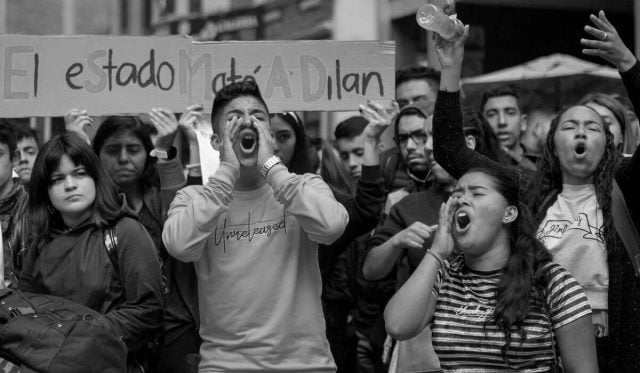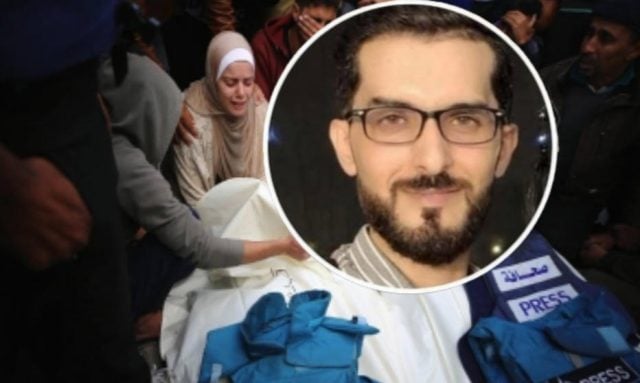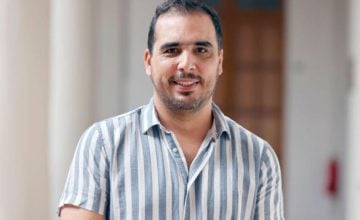This November 23, it has been one year since the vile murder of the young Dilan Cruz Medina, by the Mobile Anti-riot Squad (Esmad) of the Colombian Police. Dilan died after a bullet fired by an Esmad agent hit his head during a demonstration. The investigation remains open amid inconsistencies and a legal conflict between public powers.
A report from the RT media chain detailed that Captain Manuel Cubillos Rodríguez is currently under investigation. He was the one who was assigned the 12-gauge shotgun «with which the victim was injured in the course of rendering his services». This is explained by a judgment of the Supreme Court.
Cruz, considered the icon of anti-government protests in Colombia, died two days later. The cause was a «penetrating cranio-encephalic trauma by impact ammunition, fired by a firearm», according to Legal Medicine.
Against Cubillo there is already an open file in a military court and in the Attorney General’s Office. However, Cruz’s relatives ask that the case be transferred to the ordinary courts. They have even obtained two appeals for protection from the Supreme Court in the face of allegations of alleged inconsistencies in the investigations.
To commemorate the first anniversary of his death and demand justice, various activities were organized in Colombia. In Bogotá, sit-ins, protests and candles were lit in the vicinity of the place where Dilan was murdered, at the age of 18. The tragedy occurred during the national strike on November 21, 2019, which sparked a wave of protests.
Colombia cries out for justice
The path of legal decisions made in this case has been bumpy, details the RT report. On two occasions it seemed that the military justice would lead the investigation, but the Court stopped the decision and ordered more investigations before continuing.
For their part, Cruz’s family members insist that the file go to the Prosecutor’s Office. The reason is that they do not trust the impartiality of the Military Criminal Justice, which is responsible for sanctioning the actions of Esmad.
The Russian media explains that, to understand the intricate process, a timeline must be followed, where each of the determinations that delay the prosecution of the person responsible of this crime are found.
In December 2019, days before the first month of the murder was completed, the Disciplinary Jurisdictional Chamber of the Superior Council of the Judiciary announced that Cubillos would be tried by the military justice and not in a civil court. In his opinion, the events occurred «within the framework of an act of service» carried out by the agent involved.
This decision was made after reviewing the testimonies of four Esmad agents. All reported that their actions were justified by the riots and clashes with protesters.
Thus, the entity resolved the conflict of competences between the Military Criminal Jurisdiction and the Ordinary one, represented by the Prosecutor’s Office. The defense of Cubillos maintains that the sentence is «adjusted to the law», since it considers that the ordinary Justice does not have jurisdiction in the case.
Family objection
But, the ruling of the Judicial Council was contested by Yenny Alejandra Medina Pulido, the young man’s mother. Immediately afterwards, she presented a request for protection before the Criminal Cassation Chamber of the Supreme Court.
The highest court granted her the requested protection. Thus, it ordered the Disciplinary Jurisdictional Chamber to determine whether the case belonged to the Military Criminal Jurisdiction or to the Prosecutor’s Office. Again it had to be resolved in a «conflict of competences» in the investigation against Cubillos.
Then, the Court annulled the December 2019 resolution. They argued that «it was based solely on the assessment of testimonies from Esmad agents» and not on other witnesses.
According to the allegation, the determination to pass the file to the military courts «violates the fundamental rights to due process and access to the administration of justice». In addition, they consider that «all the evidence» was not assessed and the investigation was «based on the testimony given by members of the Public Force».
In Dilan’s family complaint, they stated that «the interviews given to the CTI [Judicial Technical Corps]» of human rights activists and district officials who accompanied the protest were set aside. These witnesses agreed that the protesters were not «attacking or provoking Esmad». On the contrary, it was the anti-riot corps that altered «the peaceful demonstration» and fired with «weapons other than stun grenades and tear gas».
On July 2 of this year, the Office of the Attorney General of Colombia advanced its own process. That day, it opened an investigation against Cubillos for the alleged use of excessive force during a police procedure.
Evolution of the case
Then, in August, the Jurisdictional Disciplinary Chamber of the Superior Council of the Judiciary again reported that it had resolved the conflict. And, once again, it determined that the investigation corresponds to the military Justice.
According to the ruling, «these events occurred in an act of the service of Captain Manuel Cubillos Rodríguez», who, as a member of Esmad, ordered «the use of force to disperse a demonstration that was taking place in the center of the city».
A month later, the Civil Cassation Chamber of the Court again objected to the resolution. In turn, it ordered a review of Cruz’s complete file to «settle the conflict between military and ordinary criminal justice».
According to its ruling, «all the evidence that was provided to him was not taken into account». In its decision, it asked the Colombian Prosecutor’s Office to send the requested interviews and ratified the invalidity of the ruling of December 12, 2019.
There are few ‘apologies’ in Colombia
Also in September, the same Civil Cassation Chamber issued an order to the authorities in charge of handling the mobilizations. «Guarantee the exercise of the right to peaceful and non-destructive protest», it demanded.
In this ruling, the suspension of the 12 gauge shotguns used by Esmad was also established. Likewise, it demanded that the Colombian Ministry of Defense to apologize for «the excesses registered since the mobilization of November 21, 2019».
Then, in October, Minister Carlos Holmes Trujillo was forced by the Superior Court of Bogotá to «ask for forgiveness». This, after a previous apology was considered insufficient.
Although there is no final judgment yet, the case of Dilan Cruz made visible the issue of police abuse and the excessive use of force. Those responsible are always the riot squads that intervene in the protests that take place in Colombia since 2019.











